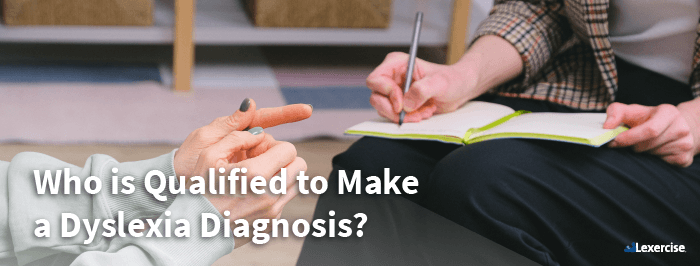Who is Qualified to Make a Dyslexia Diagnosis?
Written by Sandie Barrie Blackley, Speech-Language Pathologist
Published on March 31, 2025

Guidance on Getting a Dyslexia Diagnosis
You may be concerned that your child is dyslexic. But who is qualified to make a dyslexia diagnosis? The school may be telling you one thing while your pediatrician is telling you another. So, who is eligible to diagnose dyslexia? The therapists at Lexercise are here with insight.
Dyslexia Diagnosis Criteria from The NCLD
Unfortunately, no federal law defines who can provide a formal dyslexia diagnosis. However, The National Center for Learning Disabilities (NCLD) has advice on guidance about the diagnosis of dyslexia and the determination of a disability.
The NCLD has provided the following guidance about who may diagnose dyslexia:
“Professionals with expertise in several fields are best qualified to make a diagnosis of dyslexia. The testing may be done by a single individual or by a team of specialists. A knowledge and background in psychology, reading, language and education are necessary. The tester must have a thorough working knowledge of how individuals learn to read and why some people have trouble learning to read. They must also understand how to administer and interpret evaluation data and how to plan appropriate reading interventions.”
You can take a free online dyslexia screening test to gauge how likely it is that dyslexia is playing a role in your child’s learning difficulties. However, only a trained, knowledgeable specialist—like a therapist or clinician with dyslexia-specific certification—can provide a formal diagnosis.
Which Doctor Should I Visit for Dyslexia Diagnosis?
You might be wondering, “Can a pediatrician diagnose dyslexia?” Naturally, many parents instinctively visit their pediatrician at the first signs of dyslexia symptoms. However, your child’s primary care doctor or pediatrician cannot provide a dyslexia diagnosis unless they also have a trained dyslexia specialist on staff. In many cases, your pediatrician will simply offer a recommendation or referral to a specialist.
If you want to skip this step, you can have your child directly evaluated by a qualified therapist. Online evaluation has become especially popular with the rise of telehealth access. This process is easy and convenient for parents while offering more immediate results. If you prefer in-person care, you can also make an appointment with a qualified professional in your area.
Evaluating for Dyslexia and Other Language Processing Disorders
The following points should be included in an evaluation for dyslexia and other language processing disorders:
- Background information should be included.
- Intelligence testing is no longer considered necessary. Instead, oral language abilities (listening and speaking) are more predictive.
- Oral language skills should be documented.
- Word recognition (word reading) should be tested.
- Decoding should be tested.
- Spelling should be tested.
- Phonological processing should be tested.
- Automaticity /fluency skills should be tested.
- Text Reading /comprehension should be tested.
- Vocabulary knowledge should be tested.
- Evaluation outcomes should provide the framework for the detailed evaluation of relative strengths and weaknesses across the various skill areas.
- Diagnosis should be made by a professional who is thoroughly familiar with the important characteristics of language-literacy disorders/dyslexia.
- Intervention planning recommendations should be included in the written report.
- Documentation should acknowledge that the “specific criteria, such as cutoff scores for eligibility [for special education] vary from state to state”.
How Lexercise Can Help with Dyslexia Diagnosis and Treatment
The Lexercise Evaluation Procedures have been developed based on current dyslexia diagnosis best practices. We use the ADA (Americans with Disabilities Federal Act 1990) definition of “disability” (i.e., ”a physical or mental impairment which substantially limits one or more major life activities”).

Reading and writing are certainly considered “major life activities”. Our dyslexia evaluation is designed to determine if the individual has an “impairment which substantially limits” reading and/or writing.
Lexercise refers to professionals with this kind of expertise as “clinicians or therapists.” Our clinicians and therapists may have gotten their basic training in psychology, speech-language pathology, education, or medicine. Beyond that basic training, they have had extensive training in language science, including reading and written language science, as well as in testing and measurement.
If you are a parent ready to take the first steps toward a better understanding, you can screen your child for dyslexia for free online in just 15 minutes. You can also put your mind at ease by reading about some common dyslexia myths. Our online therapy options are here to help your child overcome the challenges of dyslexia.
Improve Your Child’s Reading
Learn more about Lexercise today.
Schedule a FREE
15-minute consultation


